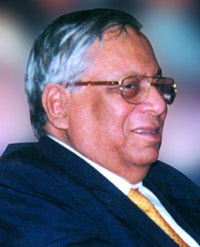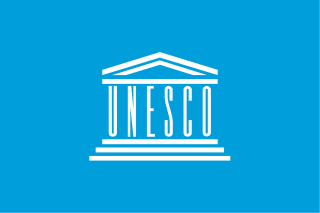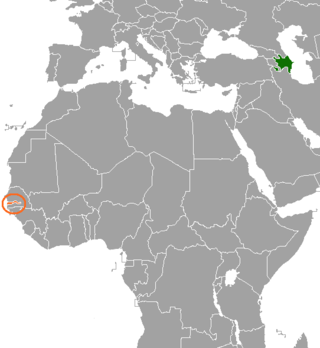
The United Nations (UN) is an intergovernmental organization whose stated purposes are to maintain international peace and security, develop friendly relations among nations, achieve international cooperation, and serve as a centre for harmonizing the actions of nations. It is the world's largest international organization. The UN is headquartered in New York City, and the organization has other offices in Geneva, Nairobi, Vienna, and The Hague, where the International Court of Justice is headquartered.

The Universal Declaration of Human Rights (UDHR) is an international document adopted by the United Nations General Assembly that enshrines the rights and freedoms of all human beings. Drafted by a UN committee chaired by Eleanor Roosevelt, it was accepted by the General Assembly as Resolution 217 during its third session on 10 December 1948 at the Palais de Chaillot in Paris, France. Of the 58 members of the United Nations at the time, 48 voted in favour, none against, eight abstained, and two did not vote.

The Organisation of Islamic Cooperation, formerly the Organisation of the Islamic Conference, is an intergovernmental organization founded in 1969, consisting of 57 member states, with 48 being Muslim-majority countries. The organisation states that it is "the collective voice of the Muslim world" and works to "safeguard and protect the interests of the Muslim world in the spirit of promoting international peace and harmony".

Louis Farrakhan is an American black supremacist and religious leader who heads the Nation of Islam (NOI). Prior to joining the NOI, he was a calypso singer who used the stage name Calypso Gene. Earlier in his career, he served as the minister of mosques in Boston and Harlem and was appointed National Representative of the Nation of Islam by then NOI leader Elijah Muhammad. He adopted the name Louis X, before being named Louis Farrakhan.
The United Nations coordinated an International Conference on Population and Development (ICPD) in Cairo, Egypt, on 5–13 September 1994. Its resulting Programme of Action is the steering document for the United Nations Population Fund (UNFPA).

Extraordinary rendition is a euphemism for state-sponsored kidnapping in another jurisdiction and transfer to a third state. The phrase usually refers to a United States-led program used during the War on Terror, which had the purpose of circumventing the source country's laws on interrogation, detention, extradition and/or torture. Extraordinary rendition is a type of extraterritorial abduction, but not all extraterritorial abductions include transfer to a third country.

Muhammad Tahir-ul-Qadri is a Pakistani–Canadian Islamic scholar and former politician who founded Minhaj-ul-Quran International and Pakistan Awami Tehreek.

Ekmeleddin Mehmet İhsanoğlu is a Turkish chemistry and science history professor, academician, diplomat and politician who was Secretary-General of the Organisation of Islamic Cooperation (OIC) from 2004 to 2014. He is also an author and editor of academic journals and advocate of intercultural dialogue.
Mahmoud Ahmadinejad was President of Iran from 3 August 2005 to 3 August 2013, and during that time had repeatedly made contentious speeches and statements against Israel. Ahmadinejad refused to call Israel by name, instead calling it the “Zionist regime”. He has called for the "elimination of the Zionist regime". Ahmadinejad took part in a protest called "The World Without Zionism" and has derided Israel on numerous occasions. He has urged regional powers to cut diplomatic and economic ties with Israel and halt oil sales. Tensions have risen over Iran's nuclear program. He has also provided funding, training and arms to what are widely regarded as terrorist organisations Hezbollah and Hamas, which are sworn enemies of Israel and waged war against Israel.

Saeed Uz Zaman Siddiqui was a Pakistani jurist and legislator of great prominence who formerly served as the 15th Chief Justice of Pakistan and, prior to that, the 7th Chief Justice of the Sindh High Court. At the time of his death, he was serving as the 31st Governor of Sindh.

Humayun Rasheed Choudhury was a Bangladeshi career diplomat and Speaker of the Bangladesh National Parliament from 1996 to 2001. He was elected president of the 41st session of the UN General Assembly in 1986. He was awarded Independence Day Award in 2018 posthumously by the Government of Bangladesh.

The United Nations Educational, Scientific and Cultural Organization (UNESCO) is a specialized agency of the United Nations (UN) aimed at promoting world peace and security through international cooperation in education, arts, sciences and culture. It has 194 member states and 12 associate members, as well as partners in the non-governmental, intergovernmental and private sector. Headquartered in Paris, France, UNESCO has 53 regional field offices and 199 national commissions that facilitate its global mandate.
The origins of the Baháʼí Faith in Bangladesh begin previous to its independence, when it was part of British Raj. The roots of the Baháʼí Faith in the region go back to the first days of the Bábí religion in 1844. During Baháʼu'lláh's lifetime, as founder of the religion, he encouraged some of his followers to move to India. It may have been Jamál Effendi who was first sent and stopped in Dhaka more than once. The first Baháʼís in the area that would later become Bangladesh was when a Bengali group from Chittagong accepted the religion while in Burma. By 1950 there were enough members of the religion to elect Local Spiritual Assemblies in Chittagong and Dacca. The total number of Baháʼís in Bangladesh is too small to have any major direct impact on society at large. However, the World Christian Encyclopedia estimated the Baháʼí population of Bangladesh about 9,603 in 2010. Baháʼís are widely persecuted in Bangladesh. According to The Business Standard the population is about 300,000.
The Islamic Solidarity Games is a multinational, multi-sport event. The Games involve the elite athletes of the Organisation of Islamic Cooperation who compete in a variety of sports. The Solidarity Games were initially created to strengthen Islamic camaraderie and reinforce the values of Islam, primarily to the youth. The Islamic Solidarity Sports Federation (ISSF) and the Organization of the Islamic Cooperation (OIC) is the organization that is responsible for the direction and control of the Islamic Solidarity Games. The ISSF strives to improve Islamic solidarity, promote Islamic identity in sports and help reduce discrimination toward Muslims.

Ahmed Mohamed Ahmed El-Tayeb is an Egyptian Islamic scholar and the current Grand Imam of al-Azhar, Al-Azhar Al Sharif and former president of al-Azhar University. He was appointed by the Egyptian President, Hosni Mubarak, following the death of Mohamed Sayed Tantawy in 2010. He is from Kurna, Luxor Governorate in Upper Egypt, and he belongs to a Sunni Muslim family.
Counter-jihad, also known as the counter-jihad movement, is a self-titled political current loosely consisting of authors, bloggers, think tanks, street movements and campaign organisations all linked by beliefs that view Islam not as a religion but as a worldview that constitutes an existential threat to Western civilization. Consequently, counter-jihadists consider all Muslims as a potential threat, especially when they are already living within Western boundaries. Western Muslims accordingly are portrayed as a "fifth column", collectively seeking to destabilize Western nations' identity and values for the benefit of an international Islamic movement intent on the establishment of a caliphate in Western countries. The counter-jihad movement has been variously described as anti-Islamic, Islamophobic, inciting hatred against Muslims, and far-right. Influential figures in the movement include the bloggers Pamela Geller and Robert Spencer.
The Fourth Extraordinary Session of the Islamic Summit was a conference organised by the Organisation of Islamic Cooperation (OIC) in Mecca on 14 and 15 August 2012. The venue of the conference was Al Safa Palace.

Abdulla Shahid is a Maldivian politician who served as President of the 76th United Nations General Assembly between 2021 and 2022. Shahid is the first Maldivian politician to hold that post. He has been serving as Minister of Foreign Affairs, Maldives since 2018.

Jubaland, the Juba Valley or Azania, is a Federal Member State in southern Somalia. Its eastern border lies 40–60 km (25–35 mi) east of the Jubba River, stretching from Gedo to the Indian Ocean, while its western side flanks the North Eastern Province in Kenya, which was carved out of Jubaland during the colonial period.

Azerbaijan–Gambia relations are the bilateral relations between Azerbaijan and The Gambia. Neither country has a resident ambassador.













